| Year | Picture | Winner | Nationality | Language(s) | Genre(s) | Ref. |
|---|
| 2021 |  | Ivan Vyskočil
(1929–2023) |  Czech Republic Czech Republic | Czech | novel, drama | [5] |
| 2020 | 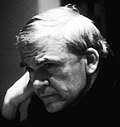 | Milan Kundera
(1929–2023) |  France/ France/ Czech Republic Czech Republic | French/Czech | novel, short story, poetry, essay, drama | [6] |
| 2019 |  | Pierre Michon
(1945–) |  France France | French | novel, short story | |
| 2018 |  | Ivan Wernisch
(1942–) |  Czech Republic Czech Republic | Czech | poetry, translation | [7] |
| 2017 |  | Margaret Atwood
(1939–) |  Canada Canada | English | poetry, novel, short story, literary criticism, essay | [8] |
| 2016 |  | Claudio Magris
(1939–) |  Italy Italy | Italian | essay, translation, novel, short story | [9] |
| 2015 |  | Eduardo Mendoza
(1943–) |  Spain Spain | Spanish | novel, short story, drama, essay | [10] |
| 2014 |  | Yan Lianke
(1958–) |  China China | Chinese | novel, short story | [11] |
| 2013 |  | Amos Oz
(1939–2018) |  Israel Israel | Hebrew | novel, short story, essay | [12] [13] |
| 2012 |  | Daniela Hodrová
(1946–2024) |  Czech Republic Czech Republic | Czech | novel | [2] |
| 2011 |  | John Banville
(1945–) |  Ireland Ireland | English | novel, short story, drama, screenplay, essay | [14] |
| 2010 | 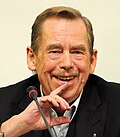 | Václav Havel
(1936–2011) |  Czech Republic Czech Republic | Czech | poetry, drama, essay | [15] |
| 2009 | 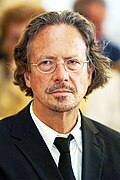 | Peter Handke
(1942–) |  Austria Austria | German | novel, poetry, essay, short story, screenplay, drama | |
| 2008 | 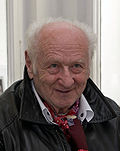 | Arnošt Lustig
(1926–2011) |  Czech Republic Czech Republic | Czech | novel, short story, drama, screenplay | [16] |
| 2007 | 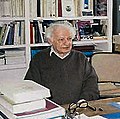 | Yves Bonnefoy
(1923–2016) |  France France | French | poetry, essay, translation, short story, history | [17] |
| 2006 |  | Haruki Murakami
(1949–) |  Japan Japan | Japanese | novel, short story, essay, memoirs | [18] |
| 2005 |  | Harold Pinter
(1930–2008) |  United Kingdom United Kingdom | English | drama, screenplay | |
| 2004 |  | Elfriede Jelinek
(1946–) |  Austria Austria | German | novel, poetry, drama, translation | |
| 2003 |  | Péter Nádas
(1942–) |  Hungary Hungary | Hungarian | drama, essay, novel | [19] |
| 2002 |  | Ivan Klíma
(1931–2025) |  Czech Republic Czech Republic | Czech | novel, drama, memoirs | [20] |
| 2001 |  | Philip Roth
(1933–2018) |  United States United States | English | novel, short story, memoirs, essay | |





















